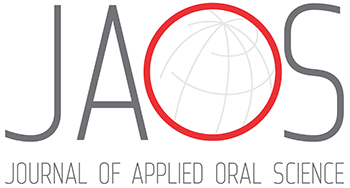Abstract
New technical and scientific developments have been advocated to promote the success of the endodontic treatment. In addition to rotary and reciprocating systems, irrigating solution agitation has been suggested and passive ultrasonic irrigation (PUI) is the most used. Objective: To evaluate, in vitro, the effect of ultrasound streaming (US) in the disinfection of flattened root canal systems prepared by the ProTaper, BioRaCe and Reciproc systems, utilizing the microbiological culture. Methodology: Extracted human mandibular incisors (n=84) were used. Suspensions of Enterococcus faecalis (ATCC 29212) were standardized and inserted along with the teeth immersed in brain-heart infusion (BHI) broth. The contamination was made following a protocol during 5 days. The teeth were randomly divided into six groups: G1, ProTaper Universal; G2, ProTaper Universal with US; G3, BioRaCe; G4, BioRaCe with US; G5, Reciproc; and G6, Reciproc with US. Irrigation was performed with saline solution. After biomechanical preparation, microbiological samples were performed with sterilized paper points, which were diluted and spread on BHI agar; after 48 h, the colony forming units (CFU/mL) were counted for each sample. Results: Groups using ultrasonic agitation presented a greater antibacterial effect than the other ones, even using saline solution as irrigant. The ProTaper Universal system showed the best antibacterial activity of the tested systems (median of 0 CFU/mL with and without surfactant or ultrasonic activation [PUI]). Even with PUI, Reciproc (median of 2.5 CFU/mL with PUI and 5 without it) could not reduce as many colonies as ProTaper Universal without US. The BioRaCe system had greater bacterial reduction when using US (median of 0 CFU/mL with PUI and 30 without it). Conclusions: US promoted greater reduction in the number of bacteria in the flattened root canals prepared with nickel-titanium mechanized systems. Regarding the instruments used, the ProTaper Universal system was the most effective in reducing the bacterial number.
Keywords:
Ultrasound; Enterococcus faecalis; Instrumentation; Irrigation

